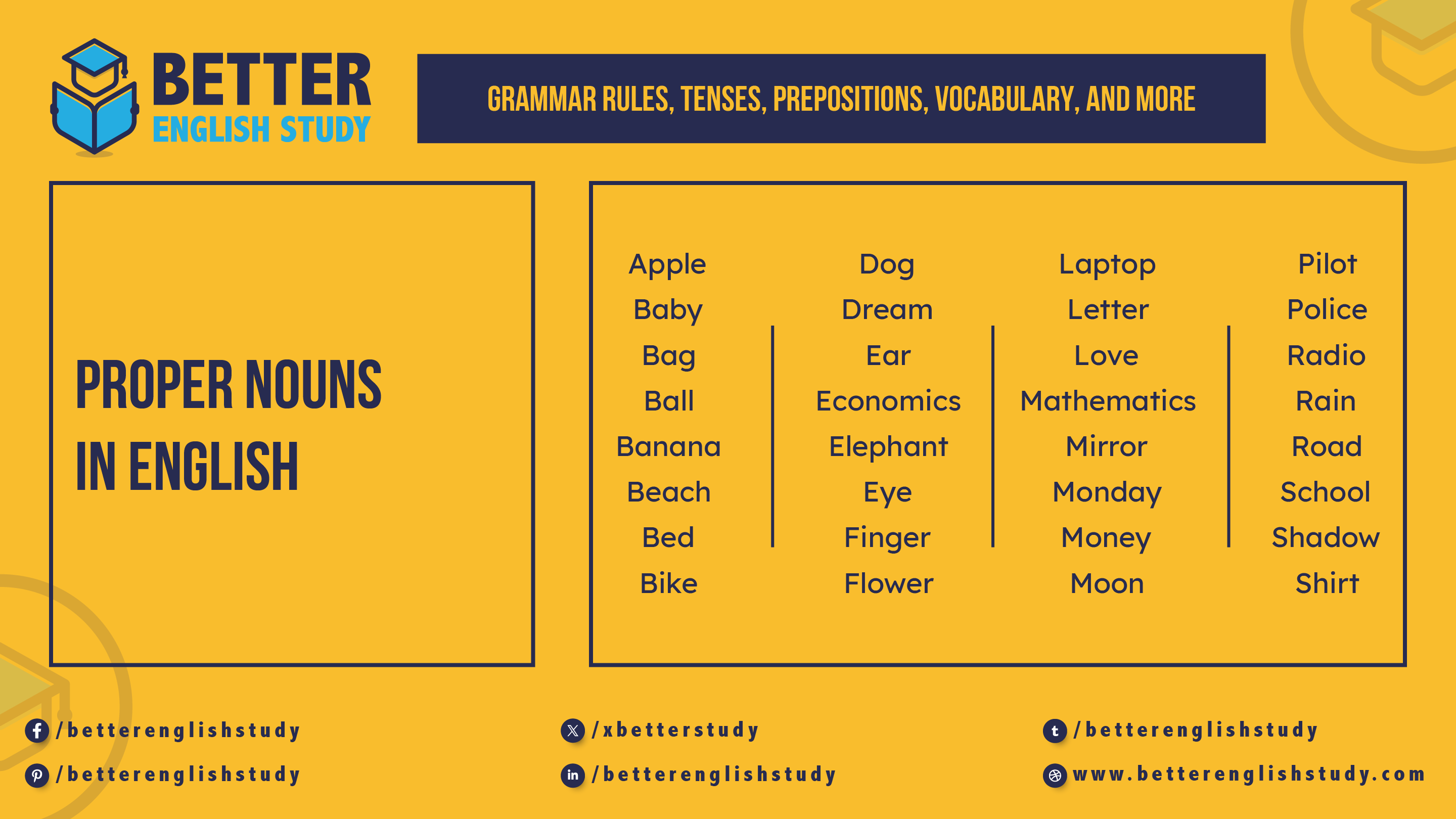
In the vast realm of the English language, nouns play a pivotal role in giving structure and meaning to our expressions. One fascinating category within nouns is the proper noun, which adds specificity and individuality to our communication.
In this article, we’ll delve into the nuances of proper nouns, exploring what they are, how to identify them, and providing examples to illuminate their usage.
What is a Proper Noun?
As a grammatical category, nouns represent people, places, things, or ideas. Among them, proper nouns are unique identifiers for particular entities.
A proper noun is a name used to denote a specific person, place, day, month, language, nationality, or event of historical importance. What sets proper nouns apart is their distinctive feature of always beginning with a capital letter.
Identifying Proper Nouns
Discerning whether a word is a proper noun involves recognizing its role as a specific name. Personal names, place names, names of companies and organizations, and titles of books, films, songs, and other media fall under the umbrella of proper nouns. It’s crucial to note that a proper noun refers to an individual entity, making it the go-to choice when communication requires precision.
To clarify this distinction, consider your name a proper noun. Just as John, Marie, London, France, or Sony are specific and unique, proper nouns encapsulate the essence of particular persons, places, and entities.
The Capital Letter Signature
One foolproof way to identify a proper noun is to observe the capital letter at the beginning. This distinguishing feature is a linguistic signal that the word represents a specific, individual entity rather than a general class or type.
List of some common Proper Nouns
| Adidas | National Geographic | The Beatles | |
| Airbnb | Google Maps | Nelson Mandela | The Great Wall of China |
| Alexa | Harvard | Netflix | The Lion King |
| Amazon | Himalayas | New York City | The Louvre |
| Apple | Hollywood | New York Times | The Pentagon |
| Bing | Indian Ocean | Nike | The Vatican |
| BMW | Industrial Revolution | Oprah Winfrey | Times Square |
| Bollywood | Paris | Tokyo | |
| British Museum | iPhone | Paris Hilton | Toyota |
| Buckingham Palace | J.K. Rowling | Pepsi | |
| Central Park | John | Potato | Uber |
| Chicago | Las Vegas | PUBG | United Nations |
| CNN | London | Red Cross | Vatican City |
| Coca-Cola | Louis Vuitton | Rolling Stone | Victoria’s Secret |
| Cow | Madison Square Garden | Samsung | Vogue |
| December | Marvel Comics | San Francisco | Volkswagen |
| Disney | Mary | Silicon Valley | Wall Street |
| Disney World | McDonald’s | Snapchat | Walmart |
| Dubai | Mexican | Sony | Washington D.C. |
| Eiffel Tower | Microsoft | Spotify | |
| Elon Musk | Mona Lisa | Starbucks | White House |
| English | Monday | Statue of Liberty | World War II |
| Mount Everest | Sydney | Xiaomi | |
| Ferrari | Mount Rushmore | Sydney Opera House | Yellowstone National Park |
| Game of Thrones | NASA | Taylor Swift | YouTube |

Examples of Proper Nouns in a Sentence
To further solidify our understanding, let’s explore some examples of proper nouns across various categories:
Personal Names:
- John is planning a trip to Paris.
- Marie loves reading mystery novels.
Place Names:
- London is known for its rich history.
- The Eiffel Tower stands tall in Paris.
Company and Organization Names:
- Sony recently launched a new gaming console.
- Employees at Google enjoy unique workplace perks.
Titles of Books, Films, Songs, and Media:
- Harry Potter and the Philosopher’s Stone is a beloved novel.
- The Shawshank Redemption remains a classic film.
Days and Months:
- Monday is the start of the workweek.
- Our vacation is planned for December.
Nationalities and Languages:
- French cuisine is renowned worldwide.
- English is spoken as a first language in many countries.
Events of Historical Importance:
- The Renaissance marked a period of cultural rebirth.
- The Industrial Revolution reshaped economies.
In each example, the capitalization of the initial letter serves as a clear indicator that we are dealing with proper nouns, emphasizing the specificity and uniqueness of the entities named.
In conclusion, understanding proper nouns is pivotal for effective communication in English. By recognizing the distinctive capital letter signature and the specificity inherent in these nouns, learners can confidently navigate language nuances. So, the next time you encounter a capitalized word, take a moment to appreciate the power of proper nouns in shaping our linguistic landscape.
